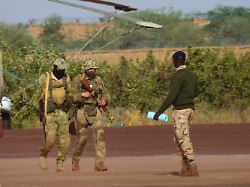gold and diamonds
In Africa, Putin can hardly do without Wagner
By Simone Schlindwein, Kampala
06/29/2023, 7:09 p.m
Russia’s foreign minister announces that Russian Wagner mercenaries will continue to operate in Africa. It is unclear who will take over the lucrative business of the mercenary group in the future.
“Wagner members work as trainers in Africa, and this work will of course continue,” assured Russia’s Foreign Minister Sergei Lavrov after the failed rebellion in Russia and the restructuring of the private Russian military company Wagner that has now begun. Numerous “foreign partners” have called Russian President Vladimir Putin in the past few days and “assured their support”.
Russia has systematically expanded its influence in Africa in recent years. Russian entrepreneur Yevgeny Prigozhin’s private security firm Wagner, who became known as “Putin’s cook,” plays a crucial role in relations with these African governments.
It is estimated that over 5,000 Wagner mercenaries are stationed in Africa, most of them in the Central African Republic and Mali as well as in Libya. However, the governments of the respective countries have not concluded any direct contracts with Wagner, but have concluded intergovernmental partnership agreements with the Russian Ministry of Defense. Initially, from 2014 onwards, Russian “instructors”, as they are officially called in these agreements, from the GRU military intelligence service were stationed in the Central African Republic, who were then gradually replaced by Wagner people. “These contracts will not change now,” says Pauline Bax from the International Crisis Group responsible. Even if Wagner disappears as a brand and company, the loyalty of African governments to Russia will remain.
“Wagner was always very useful to the Kremlin in Africa”
Until the start of Russia’s aggressive war against Ukraine, Putin always denied that the Russian state had anything to do with Wagner. After the mercenary uprising, he then said that the Wagner army was entirely funded by the Russian state. According to the Russian constitution, private security companies are actually not allowed in Russia. So far, Wagner and other mercenary companies of this type have operated outside of the applicable law, at the behest of the Kremlin, which held such a protective hand over them. Apparently that’s over now. Putin has given Wagner a deadline: The fighters should decide by July 1 whether they want to join the army as regular soldiers or emigrate to Belarus with Prigozhin.
In Africa, however, the Wagner troops pose no threat to the Kremlin, says Pauline Bax. On the contrary: “Wagner was always very useful for the Kremlin in Africa.” The Wagner employees have been entrusted with various tasks in the African countries. As bodyguards they protect the President of the Central African Republic, Faustin Touadera, as trainers they train the national army, but they also set up their own combat units that actively take action against rebels. Most of the Wagner fighters and officers stationed in Africa are not former prisoners of Russian prisons but ex-servicemen of the Russian army, says Oleg Ignatov, the Crisis Group’s Russia analyst. “It will not be difficult for them to comply with the orders of the Department of Defense and to be part of the Department of Defense again.”
Sophisticated company network
But Wagner operates in the Central African Republic under a sophisticated corporate network that is not so easy to dismantle from Moscow. In recent years, Russian parent companies from Prigozhin’s St. Petersburg corporate empire have registered numerous local subsidiaries in the Central African Republic, under the guise of which the Wagner fighters are hired.
Some of these subsidiaries have been granted mining concessions for gold and diamond mines and export licenses from which they make profits. According to the report on Wagner recently published by the investigative platform The Sentry with the catchy title “Architects of Terror” these companies usually work hand in hand.
In the Central African Republic, they are now also a huge factor economically. When the first Wagner fighters moved there in 2014, 80 percent of the country was under rebel control, especially the mines in the north. Systematically, these areas were cleared of militias by Wagner units, according to the Sentry report: “When they arrive at a mining area, they terrorize the people who live there in the gold and diamond areas until they evacuate the area voluntarily. “
In the Central African Republic, Wagner has the monopoly over the raw materials
Other companies then move into these areas. For example, two companies, the “Officers Union for International Security” (OUIS) and the “Logistique Économique Étrangère” (LEE), are responsible for logistics. OUIS imports Russian war equipment such as attack helicopters, LEE flies in machinery and building materials to set up mining operations. One timber company, “Bois Rouge”, has a timber export license and a fleet of trucks.
According to the Sentry report, Wagner now has a virtual monopoly over the country’s mines and raw materials, which they are also allowed to take out of the country. However, none of these companies has ever officially declared exports to Central African authorities. So how much money flowed from Africa to Russia in the past and in whose coffers exactly is unknown. But what happens to these companies will probably also depend on this, should Prigozhin’s empire be completely smashed in Africa as well.
